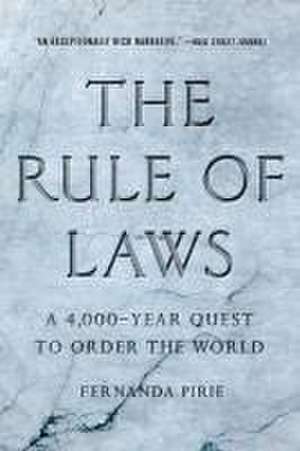The Rule of Laws
Autor Fernanda Pirieen Limba Engleză Paperback – 2 sep 2024
| Toate formatele și edițiile | Preț | Express |
|---|---|---|
| Paperback (2) | 82.57 lei 3-5 săpt. | +33.32 lei 6-12 zile |
| Profile – 3 aug 2022 | 82.57 lei 3-5 săpt. | +33.32 lei 6-12 zile |
| BASIC BOOKS – 2 sep 2024 | 131.73 lei 3-5 săpt. |
Preț: 131.73 lei
Nou
Puncte Express: 198
Preț estimativ în valută:
25.21€ • 26.95$ • 21.02£
25.21€ • 26.95$ • 21.02£
Carte disponibilă
Livrare economică 27 martie-10 aprilie
Preluare comenzi: 021 569.72.76
Specificații
ISBN-13: 9781541606050
ISBN-10: 1541606051
Pagini: 592
Dimensiuni: 140 x 210 x 38 mm
Greutate: 0.5 kg
Editura: BASIC BOOKS
ISBN-10: 1541606051
Pagini: 592
Dimensiuni: 140 x 210 x 38 mm
Greutate: 0.5 kg
Editura: BASIC BOOKS
Notă biografică
Fernanda Pirie is Professor of the Anthropology of Law at the Centre for Socio-Legal Studies at the University of Oxford, where she spent the past 10 years working with colleagues in history and anthropology looking at legal systems from throughout human history, comparing and contrasting, and charting their influence on the modern world. Prior to academia she was a practising barrister.
Recenzii
Fascinating, insightful and gripping, The Rule of Laws provides a comprehensive exploration of the history underpinning our modern legal systems. A triumph
An ambitious account of the rise and fall of the world's great legal systems ... richly informative and consistently thought-provoking .. Fernanda Pirie's work will command, and deserve, a wide readership
Exceptionally rich
The Rule of Laws offers a pathbreaking and stimulating account of how societies across different regions and epochs drew upon secular, sacred, and scholarly traditions to create laws that organized the lives of their citizens ... This expansive narrative challenges what we think we know about legal history and the assumptions we make about law's future
The Rule of Laws is a fascinating, comprehensive study that forces us to think again about what law is, and why it matters ... For those who want to understand why human society has emerged as it has, this is essential reading
In the exploration of Big questions concerning the law, legality, legal traditions and suchlike, [The Rule of Laws] will occupy an important position. It asks some fundamental questions, including where did the concept of law - and thence of the rule of law - originate? ... A vast canvas ... magisterial
Agile [and] convincing ... A valuable study for students of the law and its evolution over the millennia
In this panoramic history, Pirie tells the story of the rise and fall of systems of law across the civilizations, empires, and societies of the ancient and modern world ... Pirie argues that if the history of law has a common theme, it is that laws are not simply rules
An intriguing synthesis of the history of global legal codes and their origins
The Rule of Laws is a great overview of the history of law, covering four millennia and many different societies ... accessible to a wide readership. It dispels ideas that our current Western form of law is natural and by doing so, give us the liberty to question how it can be used or altered to make the world a better place. It also leaves us with the idea that it can be taken away
An ambitious account of the rise and fall of the world's great legal systems ... richly informative and consistently thought-provoking .. Fernanda Pirie's work will command, and deserve, a wide readership
Exceptionally rich
The Rule of Laws offers a pathbreaking and stimulating account of how societies across different regions and epochs drew upon secular, sacred, and scholarly traditions to create laws that organized the lives of their citizens ... This expansive narrative challenges what we think we know about legal history and the assumptions we make about law's future
The Rule of Laws is a fascinating, comprehensive study that forces us to think again about what law is, and why it matters ... For those who want to understand why human society has emerged as it has, this is essential reading
In the exploration of Big questions concerning the law, legality, legal traditions and suchlike, [The Rule of Laws] will occupy an important position. It asks some fundamental questions, including where did the concept of law - and thence of the rule of law - originate? ... A vast canvas ... magisterial
Agile [and] convincing ... A valuable study for students of the law and its evolution over the millennia
In this panoramic history, Pirie tells the story of the rise and fall of systems of law across the civilizations, empires, and societies of the ancient and modern world ... Pirie argues that if the history of law has a common theme, it is that laws are not simply rules
An intriguing synthesis of the history of global legal codes and their origins
The Rule of Laws is a great overview of the history of law, covering four millennia and many different societies ... accessible to a wide readership. It dispels ideas that our current Western form of law is natural and by doing so, give us the liberty to question how it can be used or altered to make the world a better place. It also leaves us with the idea that it can be taken away
